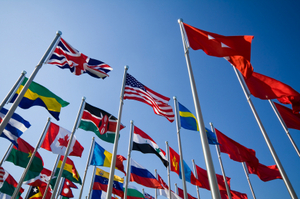
Private international organizations increasingly set the rules for business activity around the world, but domestic institutions still matter even in setting global rules.
An ever-increasing share of economic activity is governed by international rather than domestic rules or standards, often developed by private bodies. Frequently, such global private regulation entails no market competition among multiple rulemakers. Instead, a single organization serves as the clear institutional focal point in its area of expertise and is largely uncontested in making the rules for global markets. As a result, once such a private-sector body develops a standard, it becomes the global rule.
New Private Rulers: A Fundamental Change in Global Governance
A key reason for this fundamental change in global governance is that governments have increasingly delegated regulatory authority to private international organizations—motivated not only by the economic benefits of common rules for global markets, but also by the realization that government regulators often lack the expertise and resources to deal with increasingly complex and urgent regulatory tasks in internationally integrated markets. A preference for, or deference to, rules developed by international private-sector organizations has literally been written into numerous G-7 and G-20 agreements, the WTO treaty, and many countries’ laws and regulations. As a result of this simultaneous internationalization and privatization of regulation, private rules developed in such focal institutions now govern key aspects of product and financial markets with far-reaching consequences for firms, national economies, the global distribution of production, and the stability of the international financial system.
Who, however, actually makes the rules in these private bodies? Who sits “at the table” and who is excluded? Who exerts the greatest influence in such focal institutions and how? Most importantly: why do some win and others lose in transnational private rulemaking?
New Global Rulers: Advancing Theory and Empirical Knowledge
Until now, scholars and decisionmakers have lacked ready answers to these questions, partly because the heightened economic and political importance of this type of global regulation is such a recent development. Whereas market-based competition between individual companies, consortia of firms, or NGOs to establish their preferred standards as de facto global rules had attracted much attention in economics and other social sciences, little theoretical or empirical work had been done on rulemaking where the conflicts of interest take place within designated private institutions.
A major transatlantic research project, which we have jointly directed, has sought to address these gaps in our understanding of global regulation. We present the key findings in our new book, New Global Rulers: The Privatization of Regulation in the World Economy.
We develop an original analytical approach that understands private rulemaking in international organizations primarily as a highly institutionalized political process, though the politics are conducted in technical language. This understanding of international standard-setting implies that influence in transnational regulatory institutions is not a function of the economic power of states. Instead, as we explain in the book, the ability to shape outcomes at the international level should depend on how well stakeholders are organized at the domestic level, that is, on domestic standards organizations’ ability to “complement” the international institutions.
Our empirical analysis focuses on three of the most important private organizations whose seemingly technical rules play a crucial role in the world economy. One of the three organizations is the International Accounting Standards Board (IASB), whose rules govern financial reporting by corporations in more than a hundred countries. Its international financial reporting standards (IFRS) affect, for instance, how costly it is for a company to raise capital by determining the company’s bottom-line; they create incentives or disincentives to invest in R&D, or to calculate risks in particular ways. The two other key rulemakers are the International Organization for Standardization (ISO) and the International Electrotechnical Commission (IEC), which jointly account for 85 percent of all international standards for the design or performance of manufactured goods. Their product standards determine market access, consumer and workplace safety, quality assurance, and competitiveness.
As non-governmental organizations, these global regulatory bodies have only minimal record-keeping requirements. We therefore have examined them through multi-country, multi-industry business surveys among more than two thousand firms and over two hundred interviews.
Domestic Institutions Remain Crucial to Global Regulation
Our analysis shows that rulemaking in private international organizations is indeed a highly political process. And because the stakes are high, conflicts of interest are common in international standard-setting, especially between U.S. and European stakeholders. Yet, strikingly, states play little role in this process.
Even more strikingly, although rulemaking has shifted to the international level, domestic institutions remain crucial for exerting influence over international standards, because they differ in how well they complement the private international regulatory bodies. Specifically, the institutional structure and decisionmaking rules of IASB and ISO/IEC make it essential for a country’s stakeholders to learn about the international standardization agenda early and to speak with a single voice during the rulemaking process. But organizational incentives to disseminate information and domestic institutions’ capacity to aggregate the interests of domestic stakeholders vary by country and by industry. U.S. domestic institutions exhibit these characteristics in finance but lack them in product standardization; European domestic and regional institutions exhibit these characteristics in product but not financial standardization. This explains why U.S. interests tend to prevail systematically in private financial market regulation, whereas European interests tend to prevail in the private regulation of international product markets.
Büthe and Mattli are co-directors of the International Standards Project and co-authors of New Global Rulers: The Privatization of Regulation in the World Economy, published by Princeton University Press.





